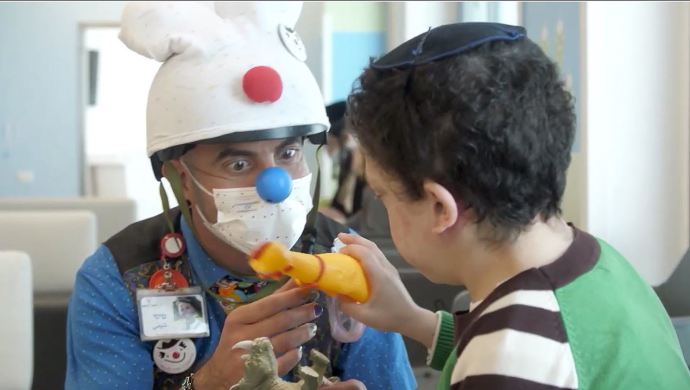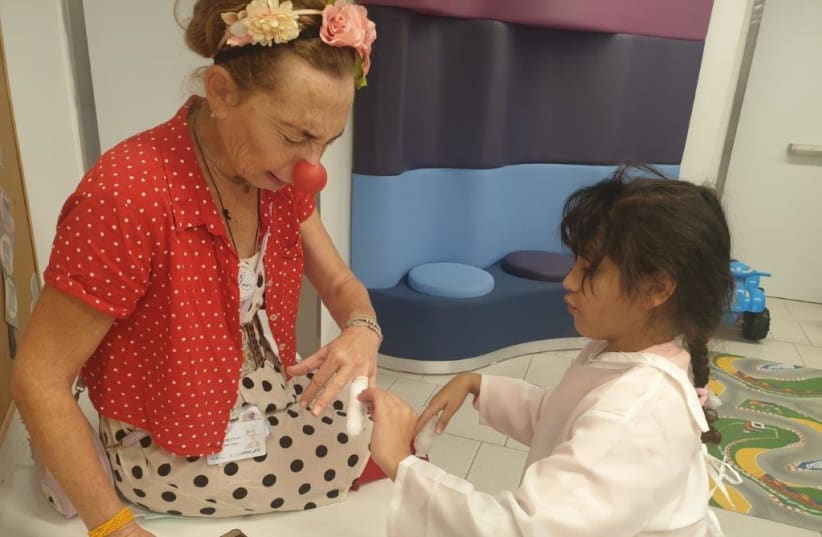Every time that Shaindy Cohen has to be hospitalized in the intensive care unit at Samson Assuta Ashdod University Hospital, her mother, Sara, can relax. That’s because she knows that a “Dream Doctor,” a medical clown, will hold Shaindy’s hand along the way.
“They calm her down, make her happy,” Cohen said. “The more often they come, the happier she is, so of course her healing process is much quicker.”
Assuta Ashdod employs four medical clowns, affectionately known as Fifi, Similac, Fiona and Dr. Gaston.
According to Dr. Yonatan Yeshayahu, head of the Pediatric Department at Assuta Ashdod, “we see them as part of our team.”
“The clowns work in the pediatric department,” he said,“in clinics and the pediatric emergency room.They even assist in the operating rooms. They help the children to remain calm and more cooperative.”
Bring laughter, happiness and healing to the pediatric patients at Assuta Ashdod. Learn more and make a gift.


“Before the clowns became an integral part of the healing process, there were many things that were extremely difficult to do for the children,” Yeshayahu said. “Getting close to a child with a fracture, for example, is nearly impossible without their assistance.”
Yeshayahu explained that being a medical clown takes a lot of expertise. The clowns need to understand the procedures and how to help without getting in the way. They also offer support to parents.
He said that when the clowns came on the scene, doctors thought they would be “nice to have.” But now, “we realize they are essential. We do not have enough hours with them. And we don’t have enough clowns.”
PENNY HANUKA, “Fifi,” is one of Assuta Ashdod’s clowns. She is an actress who has also served as a medical clown for 15 years.
Fif has helped in many ways over the years using creativity, humor and fun.Memorable moments include playing an imagination game with an autistic child waiting for an X-ray; dancing a jig in the ICU; and blowing bubbles while blood is being taken.
“I remember a little girl who was in a car accident and waiting for her mom to arrive,” Fifi recalled. “The doctors called us to come and see her, to calm her down and connect with her.”
The child, only five years old, had a badly fractured hand. She was hysterical with fear and pain. But with a little happiness and love, Fifi managed to put some color back into her face. And, by the time the mother came, she saw a calm child and was better able to support her daughter.
While the medical and technical staff provide physical treatment, the clowns offer emotional and spiritual support. Together, we give the child a positive experience.”
“It’s not just fun and games,”Fifi said. “Medical clowning is based on a lot of scientific research.”
“I was about to go into surgery, I was scared and nervous,” said Shira Kochavi. “Without Fifi, I would not have had the courage to go in.”
Shira had several surgeries. During the first two, there was no medical clown and “it was very hard for her, there was a lot of crying, fear and pain,” mother Chen Kochavi described. “Fifi’s presence gave Shira a lot of strength, it gave her a lot of confidence.
“Fifi told her she would wait for her after the surgery,” Kochavi added, “and she was waiting next to her bed.”
This article was written in cooperation with Samson Assuta Ashdod University Hospital. Help the hospital bring happiness to countless children this holiday season. Make a gift.
